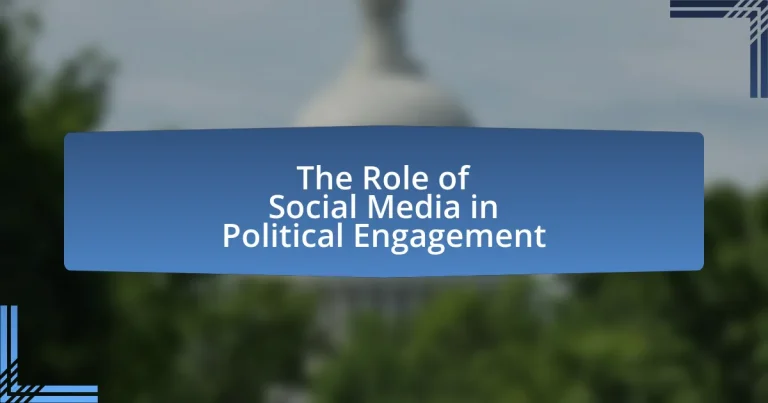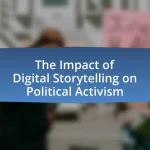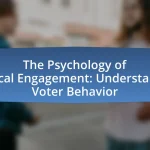The article examines the significant role of social media in political engagement, highlighting its impact on communication, mobilization, and information dissemination among citizens and political entities. It discusses how platforms like Twitter and Facebook have transformed political discourse by enabling direct interaction between politicians and the public, fostering grassroots movements, and influencing public opinion formation. Key features such as interactivity, accessibility, and real-time information sharing are explored, along with the varying ways different demographics utilize social media for political purposes. The article also addresses challenges such as misinformation and polarization, while outlining future trends and best practices for enhancing political engagement through social media.
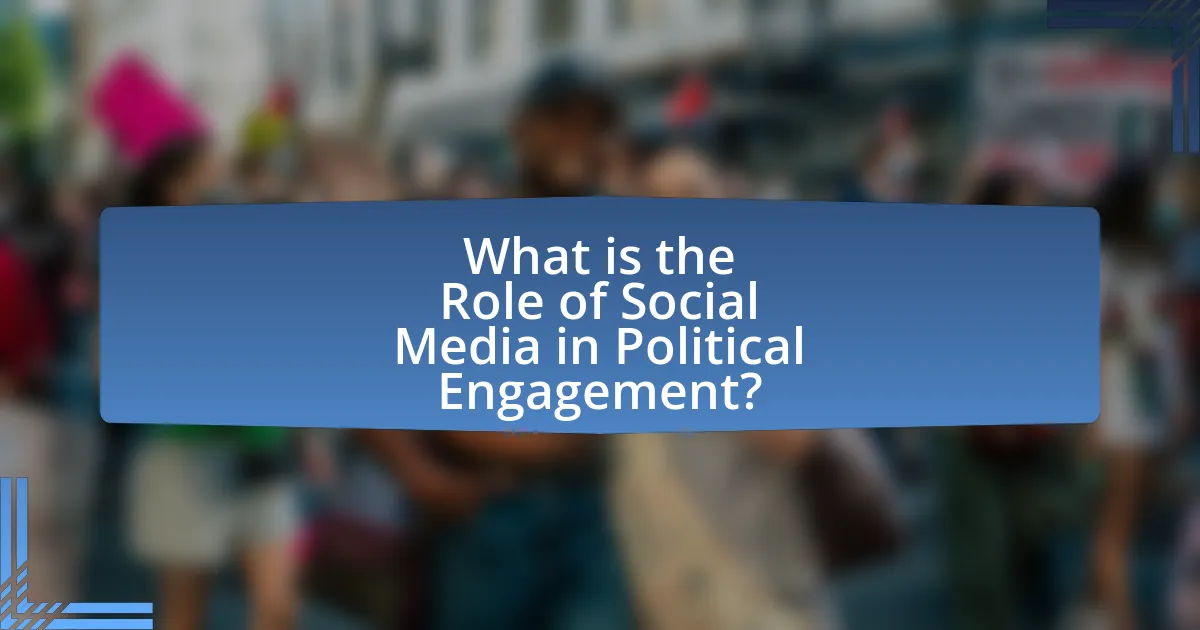
What is the Role of Social Media in Political Engagement?
Social media plays a crucial role in political engagement by facilitating communication, mobilization, and information dissemination among citizens and political entities. It enables users to share opinions, organize events, and participate in discussions, thereby increasing political awareness and participation. For instance, studies have shown that platforms like Twitter and Facebook have been instrumental in movements such as the Arab Spring, where social media was used to coordinate protests and spread information rapidly. Additionally, a Pew Research Center study indicates that 69% of adults in the U.S. use social media, highlighting its significance as a tool for political discourse and engagement.
How has social media transformed political engagement?
Social media has transformed political engagement by enabling direct communication between politicians and the public, fostering greater participation in political discourse. Platforms like Twitter and Facebook allow for real-time interaction, where citizens can express opinions, mobilize support, and organize events, significantly increasing political activism. According to a Pew Research Center study, 69% of adults in the U.S. use social media, and 20% have engaged in political activities through these platforms, illustrating the shift from traditional media to digital engagement. This transformation has also led to the rise of grassroots movements, as seen in the Arab Spring, where social media played a crucial role in organizing protests and disseminating information.
What are the key features of social media that facilitate political engagement?
Key features of social media that facilitate political engagement include interactivity, accessibility, and real-time information sharing. Interactivity allows users to engage in discussions, share opinions, and mobilize support for political causes, enhancing community involvement. Accessibility ensures that a wide audience can participate in political discourse, as platforms are available to anyone with internet access, thus democratizing information dissemination. Real-time information sharing enables rapid updates on political events, fostering timely responses and engagement from users. These features collectively empower individuals to participate actively in the political process, as evidenced by the significant role social media played in movements like the Arab Spring, where platforms were used to organize protests and spread awareness.
How do different demographics use social media for political purposes?
Different demographics utilize social media for political purposes in distinct ways, influenced by factors such as age, ethnicity, and socioeconomic status. For instance, younger individuals, particularly those aged 18-29, predominantly use platforms like Instagram and TikTok to engage with political content, often sharing memes and videos that resonate with their peers, as evidenced by a Pew Research Center study indicating that 71% of this age group uses social media for political discussions. In contrast, older demographics, such as those aged 50 and above, tend to favor Facebook for political engagement, utilizing it to connect with community groups and share news articles, with 62% of older adults reporting that they use social media to stay informed about political issues. Additionally, ethnic minorities often leverage social media to amplify their voices and mobilize support for social justice causes, as seen in movements like Black Lives Matter, which gained significant traction through platforms like Twitter and Instagram. These patterns illustrate how different demographic groups adapt their social media use to fulfill specific political objectives, reflecting their unique perspectives and needs.
Why is social media important for political discourse?
Social media is important for political discourse because it facilitates real-time communication and engagement among citizens, politicians, and organizations. This platform allows for the rapid dissemination of information, enabling users to share opinions, mobilize support, and participate in discussions on political issues. According to a Pew Research Center study, 69% of adults in the U.S. use social media, making it a significant space for public debate and political engagement. Furthermore, social media has been shown to influence political participation; for instance, during the Arab Spring, platforms like Twitter and Facebook played crucial roles in organizing protests and spreading awareness.
What impact does social media have on public opinion formation?
Social media significantly influences public opinion formation by facilitating the rapid dissemination of information and enabling user engagement. Platforms like Twitter and Facebook allow individuals to share news, opinions, and personal experiences, which can shape perceptions and attitudes on various issues. Research indicates that social media can amplify certain viewpoints, as users are more likely to engage with content that aligns with their beliefs, creating echo chambers. A study by the Pew Research Center found that 62% of adults in the U.S. get news from social media, highlighting its role as a primary information source. This accessibility and engagement can lead to shifts in public opinion, particularly during critical events like elections or social movements.
How does social media influence political mobilization and activism?
Social media significantly influences political mobilization and activism by providing platforms for rapid information dissemination and community building. These platforms enable users to share political content, organize events, and engage in discussions, which can lead to increased awareness and participation in political movements. For instance, the Arab Spring demonstrated how social media facilitated protests and mobilized citizens across multiple countries, with platforms like Twitter and Facebook being instrumental in coordinating actions and spreading messages. Research by the Pew Research Center indicates that 69% of adults in the U.S. use social media, highlighting its potential reach and impact on political engagement.
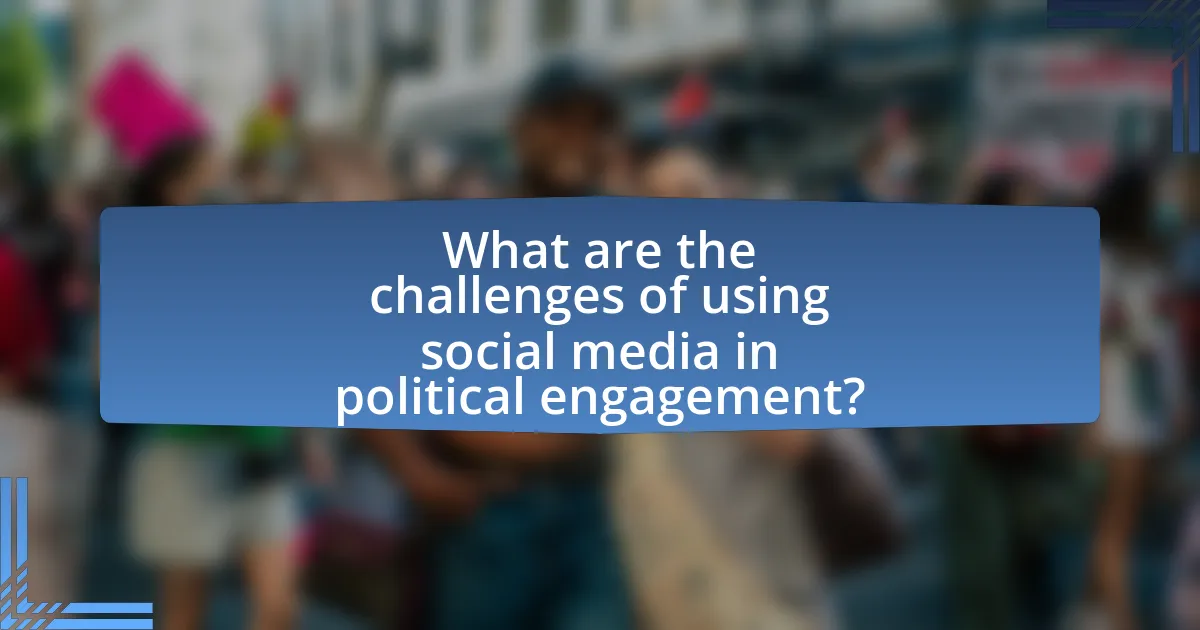
What are the challenges of using social media in political engagement?
The challenges of using social media in political engagement include misinformation, polarization, and the digital divide. Misinformation spreads rapidly on social media platforms, leading to confusion and misinformed public opinions, as evidenced by studies showing that false news stories are 70% more likely to be retweeted than true ones. Polarization occurs as algorithms often promote content that aligns with users’ existing beliefs, creating echo chambers that hinder constructive dialogue. Additionally, the digital divide limits access to social media for certain demographics, resulting in unequal participation in political discourse, with reports indicating that 25% of Americans do not use social media. These factors collectively undermine the effectiveness of social media as a tool for political engagement.
What are the risks associated with misinformation on social media?
Misinformation on social media poses significant risks, including the erosion of public trust, the spread of false narratives, and potential harm to public health and safety. The erosion of public trust occurs as individuals become skeptical of information sources, leading to decreased civic engagement and polarization. The spread of false narratives can influence political opinions and behaviors, as evidenced by studies showing that misinformation can sway election outcomes. Additionally, misinformation related to health, such as false claims about vaccines, can lead to public health crises, as seen during the COVID-19 pandemic when misleading information contributed to vaccine hesitancy. These risks highlight the critical need for media literacy and fact-checking initiatives to combat the adverse effects of misinformation.
How does misinformation affect voter behavior and political outcomes?
Misinformation significantly alters voter behavior and political outcomes by shaping perceptions and influencing decision-making processes. Studies indicate that exposure to false information can lead to increased polarization among voters, as individuals often align with narratives that confirm their pre-existing beliefs. For instance, research published in the journal “Nature” by Vosoughi, Roy, and Aral in 2018 found that false news stories spread more rapidly on social media than true stories, impacting public opinion and voter mobilization. Furthermore, misinformation can suppress voter turnout by creating confusion about voting procedures or candidate positions, as evidenced by the 2020 U.S. presidential election, where misleading information about mail-in voting led to significant voter apprehension. Thus, misinformation not only distorts individual voter choices but also has broader implications for electoral integrity and democratic processes.
What measures can be taken to combat misinformation on social media?
To combat misinformation on social media, platforms can implement fact-checking systems that verify the accuracy of content before it is widely disseminated. Research by the Pew Research Center indicates that 64% of Americans believe social media has a significant role in spreading misinformation, highlighting the need for proactive measures. Additionally, social media companies can enhance algorithms to detect and flag false information, thereby reducing its visibility. Collaborating with independent fact-checkers can further ensure that users are presented with accurate information, as evidenced by initiatives like Facebook’s partnership with third-party fact-checking organizations. These measures collectively contribute to a more informed user base and mitigate the impact of misinformation on political engagement.
How does social media affect political polarization?
Social media significantly contributes to political polarization by creating echo chambers where users are exposed primarily to viewpoints that reinforce their existing beliefs. This phenomenon occurs because algorithms prioritize content that aligns with users’ preferences, leading to a lack of diverse perspectives. Research by the Pew Research Center indicates that individuals who frequently use social media are more likely to encounter extreme political views, which can intensify partisan divides. Additionally, studies show that social media platforms facilitate the spread of misinformation, further exacerbating polarization by distorting users’ understanding of political issues.
What role do echo chambers play in political engagement on social media?
Echo chambers significantly influence political engagement on social media by reinforcing existing beliefs and limiting exposure to diverse viewpoints. These environments create a feedback loop where users are primarily exposed to information that aligns with their pre-existing opinions, which can intensify political polarization. Research indicates that individuals within echo chambers are more likely to engage in political discussions and activism, as they feel validated by their peers. A study by the Pew Research Center found that 62% of social media users encounter only like-minded opinions, which can lead to increased political participation among those users.
How can social media platforms mitigate polarization among users?
Social media platforms can mitigate polarization among users by implementing algorithms that promote diverse viewpoints and encouraging constructive dialogue. Research indicates that exposure to a variety of perspectives can reduce echo chambers, which are known to exacerbate polarization. For instance, a study by the Pew Research Center found that users who engage with content from opposing viewpoints are more likely to develop a nuanced understanding of issues, leading to decreased polarization. Additionally, features that facilitate respectful discussions and highlight common ground can foster a more inclusive environment, further reducing divisive interactions.
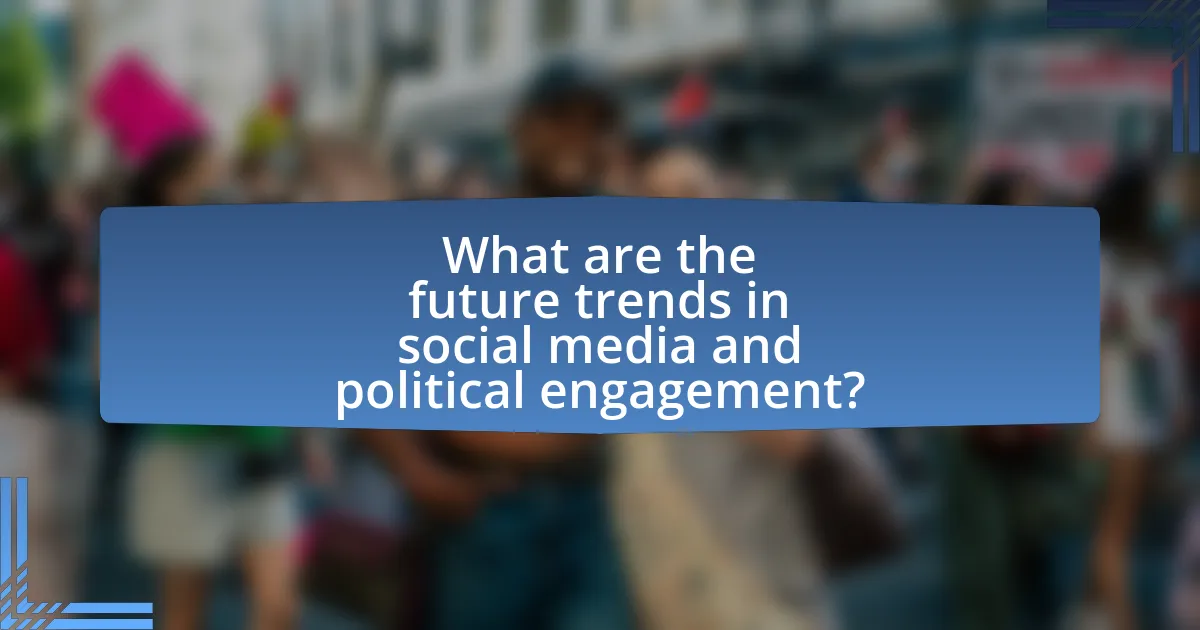
What are the future trends in social media and political engagement?
Future trends in social media and political engagement include increased use of artificial intelligence for personalized content delivery, the rise of decentralized platforms, and a growing emphasis on transparency and accountability. Artificial intelligence will enable platforms to tailor political messages to individual users, enhancing engagement and potentially influencing voter behavior. Decentralized platforms, such as those built on blockchain technology, are expected to provide users with more control over their data and reduce censorship, fostering a more open political discourse. Additionally, as misinformation becomes a critical concern, social media companies are likely to implement stricter measures to ensure the authenticity of information shared, thereby promoting a more informed electorate. These trends are supported by research indicating that personalized content significantly increases user engagement and that transparency in information sources is crucial for building trust in political communications.
How is technology evolving to enhance political engagement through social media?
Technology is evolving to enhance political engagement through social media by integrating advanced algorithms, data analytics, and interactive features that facilitate user participation. For instance, platforms like Facebook and Twitter utilize machine learning to tailor content to users’ interests, increasing the likelihood of engagement with political discussions. Additionally, the rise of live streaming and interactive polls allows users to engage in real-time conversations with political figures, fostering a sense of community and immediacy. According to a Pew Research Center study, 69% of adults in the U.S. use social media for news, highlighting its role in shaping political discourse and mobilizing voters. These technological advancements not only amplify voices but also create more informed and active citizenry.
What role do algorithms play in shaping political content on social media?
Algorithms play a crucial role in shaping political content on social media by determining what information users see based on their preferences and behaviors. These algorithms analyze user interactions, such as likes, shares, and comments, to curate content that aligns with individual interests, often amplifying politically charged messages that resonate with users. Research by the Pew Research Center indicates that 64% of Americans believe social media has a significant impact on their political views, highlighting the influence of algorithm-driven content curation. Consequently, algorithms can create echo chambers, where users are exposed primarily to viewpoints that reinforce their existing beliefs, thereby affecting political discourse and engagement.
How might emerging platforms change the landscape of political engagement?
Emerging platforms are likely to transform the landscape of political engagement by facilitating direct communication between politicians and constituents, thereby enhancing transparency and participation. For instance, platforms like TikTok and Clubhouse have already demonstrated their ability to engage younger demographics in political discourse, as seen in the 2020 U.S. elections where TikTok users mobilized voter registration efforts. This shift allows for real-time feedback and interaction, which can lead to more responsive governance. Additionally, the use of algorithms on these platforms can amplify diverse voices and issues that may be overlooked in traditional media, fostering a more inclusive political dialogue.
What best practices can enhance political engagement on social media?
To enhance political engagement on social media, organizations and individuals should prioritize authenticity, consistent messaging, and interactive content. Authenticity fosters trust, as users are more likely to engage with genuine voices rather than scripted or overly polished messages. Consistent messaging ensures that the audience receives clear and coherent information, which can lead to increased understanding and participation in political discussions. Interactive content, such as polls, Q&A sessions, and live discussions, encourages active participation and allows users to feel more involved in the political process. Research indicates that posts with interactive elements can increase engagement rates by up to 50%, demonstrating the effectiveness of these practices in fostering political discourse.
How can individuals effectively use social media for political advocacy?
Individuals can effectively use social media for political advocacy by creating engaging content that resonates with their audience and encourages action. This involves sharing informative posts, utilizing hashtags to increase visibility, and participating in discussions to raise awareness about specific issues. Research indicates that social media campaigns can significantly influence public opinion; for instance, a study by the Pew Research Center found that 69% of adults in the U.S. use social media, making it a powerful tool for mobilizing support and fostering community engagement around political causes. By leveraging these platforms, individuals can amplify their voices, connect with like-minded advocates, and drive meaningful change in their communities.
What strategies can organizations implement to engage audiences politically on social media?
Organizations can implement targeted content creation, interactive campaigns, and community building to engage audiences politically on social media. Targeted content creation involves producing relevant and timely posts that resonate with specific demographics, which can increase engagement rates. For instance, using data analytics to understand audience preferences allows organizations to tailor their messages effectively. Interactive campaigns, such as polls, Q&A sessions, and live discussions, encourage audience participation and foster a sense of community. Research shows that posts with interactive elements receive 50% more engagement than static posts. Lastly, community building through consistent communication and responding to audience feedback creates a loyal following, enhancing political discourse. According to a study by the Pew Research Center, 70% of social media users engage with political content when they feel part of a community.
